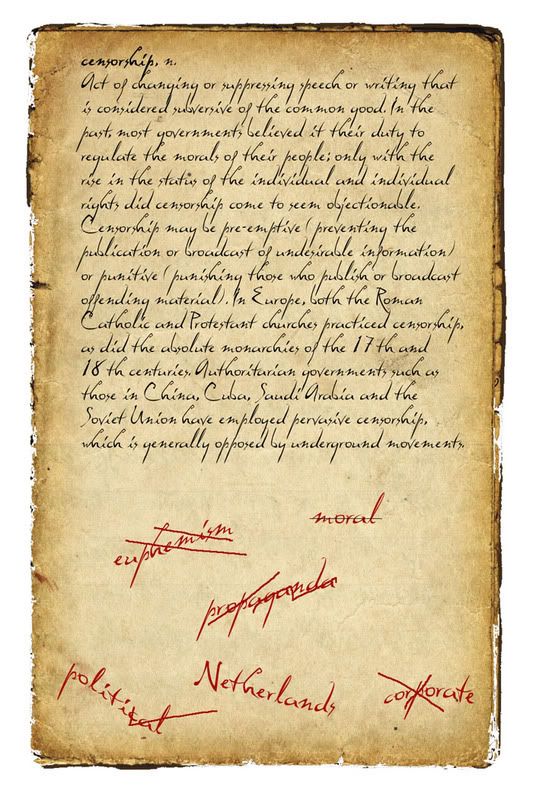Gideon Prewett, sheet of parchment, October 1974
Name: Gideon Prewett
Format: Sheet of parchment with an excerpt from an encyclopaedia and additional notes
Date: Approx. October 1974
Relevance: This sheet of parchment was found in one of the drawers in G. Prewett's desk after his death. It reveals his interest in political use of the media and his possible subsequent involvement in a group working against censorship.

Archivist's notes:
It appears that the quote from some unknown encyclopaedia was written out by a DictaQuill, set to imitate G. Prewett's handwriting, albeit in a very regular manner. The notes in red below, however, seem to be written by himself. It is not known why deceased decided to copy a whole passage about something he must already have been familiar with for years.
Transcript:
censorship, n.
Act of changing or suppressing speech or writing that is considered subversive of the common good. In the past, most governments believed it their duty to regulate the morals of their people; only with the rise in the status of the individual and individual rights did censorship come to seem objectionable. Censorship may be pre-emptive (preventing the publication or broadcast of undesirable information) or punitive (punishing those who publish or broadcast offending material). In Europe, both the Roman Catholic and Protestant churches practiced censorship, as did the absolute monarchies of the 17th and 18th centuries. Authoritarian governments such as those in China, Cuba, Saudi Arabia and the Soviet Union have employed pervasive censorship, which is generally opposed by underground movements.
euphemism
moral
propaganda
political
Netherlands
corporate
Format: Sheet of parchment with an excerpt from an encyclopaedia and additional notes
Date: Approx. October 1974
Relevance: This sheet of parchment was found in one of the drawers in G. Prewett's desk after his death. It reveals his interest in political use of the media and his possible subsequent involvement in a group working against censorship.

Archivist's notes:
It appears that the quote from some unknown encyclopaedia was written out by a DictaQuill, set to imitate G. Prewett's handwriting, albeit in a very regular manner. The notes in red below, however, seem to be written by himself. It is not known why deceased decided to copy a whole passage about something he must already have been familiar with for years.
Transcript:
censorship, n.
Act of changing or suppressing speech or writing that is considered subversive of the common good. In the past, most governments believed it their duty to regulate the morals of their people; only with the rise in the status of the individual and individual rights did censorship come to seem objectionable. Censorship may be pre-emptive (preventing the publication or broadcast of undesirable information) or punitive (punishing those who publish or broadcast offending material). In Europe, both the Roman Catholic and Protestant churches practiced censorship, as did the absolute monarchies of the 17th and 18th centuries. Authoritarian governments such as those in China, Cuba, Saudi Arabia and the Soviet Union have employed pervasive censorship, which is generally opposed by underground movements.
euphemism
moral
propaganda
political
Netherlands
corporate